初中一般现在时,一般过去时,一般将来时,现在进行时总结练习
初中英语一般现在时、一般过去时、一般将来时部分

一般现在时专项练习题1.概念:一般现在时表示经常的、习惯性的动作或存在的状态一般现在时表示现在经常反复发生的动作、存在的状态或习惯性的动作的时态。
可概括为①经常性或习惯性动作;②长期存在的特征或状态;③普遍真理、客观事实等。
2.构成:一般现在时的构成主要有两种形式,一般现在时用行为动词的原形,但第三人称单数作主语时,动词的词尾要加-S。
:(1)be型:句子的谓语动词只有be(am,is或are):a.肯定句中,只出现be,如:I am a student.我是一名学生。
b.否定句中,要在be后面加not,如:She isn't a teacher.她不是教师。
c.一般疑问句,要将be放在句子开头(注意句首字母大写),句尾用问号,答语用Yes,主语+be.或No,主语+be+not.如:—Are you ready?—你准备好了吗?—Yes,I am.—是的,我准备好了。
(—No,I'm not.—不,我没准备好。
)(2)实义动词型:句中的谓语动词为实义动词(也叫行为动词):a.肯定句中,只出现实义动词,如:I get up in the morning.我早晨起床。
b.否定句中,要在实义动词前面加do(does)+not,do(does)作助动词,本身无意义,常与not缩写成don't(doesn't),如:I don't like vegetables.我不喜欢蔬菜。
c.一般疑问句,要在句子开头加助动词Do(does),句尾用问号,简略答语用Yes,主语+do(does).或No,主语+do(does)+not.如:—Do you like oranges?—你喜欢桔子吗?—Yes,I do.—是的,我喜欢。
(—No,I don't.—不,我不喜欢。
)3, 一般现在时的用法1) 经常性或习惯性的动作,常与表示频度的时间状语连用。
时间状语:every…, sometimes, at…,on Sunday I leave home for school at 7 every morning.2) 客观真理,客观存在,科学事实。
一般现在时、一般过去时、现在进行时、现在完成时、过去完成时、过去将来时、一般将来时初中全部时态练习题

时态专项复习(一般现在时、现在进行时、一般过去时)一、用动词的正确形式填空1. I ________ (do) my homework every evening.2. We _______ (fly) kites in the park on Sundays.3. My mother _____________ (clean) our room on Sundays.4. Tom ____________(play) the piano every Saturday. Now he____________ (play).5. She ___________(like) swimming. She _____________ (swim) last weekend.6. Usually my mother _______________ (wash) the dishes after lunch. But my grandma _____________ (wash) today.7. Look at the man! He ____________ (read) a magazine.8. Look! The plane ______________ (fly) over the building.9. Listen! My aunt ______________ (sing) in the room.She is a singer. She __________ (like) singing. She _____________(have) a music show. She is excited.10. Tom and Mike always ______________ (swim) in the river. They ___________ (swim) in the swimming pool three days ago. Look! They ________________ (swim).11. What ____ you usually ______ (do) in the evening? I ______ (play) computer games.12. What _______ you _______ (do) now? I __________ (make) a paper plane.13. What _______ he _______ (do) now? He _____________ (dance).14. What _______ she ______ (do) yesterday? She ______ (visit) her grandparents.15. ______ your mother ______ (read) newspaper in the morning? Yes, She ________ .16. _______ you _______ (like) fishing? No, I ______ . I like __________ (swim), but my brother___________ (like).17. How ______ your father _______ (go) to work every day? He _________ (go) by bike. But itcold today. He ___________ (take) the No.21 bus,, and he ____________ (go) to work by taxi yesterday.18. _______ the monkey _______ (like) climbing trees? Yes, it _______ .19. What _______ your father ______ (do) after lunch? He _______ (read) a comic book. What_____ he _______(do) today? He _______ (clean) the kitchen for my grandma. Look! He (clean).20. ________ you ______ (collect) stamps? Yes. I _______ . ________ your brother ______ (collect), too? No, he ________ .二、选择题1. _____ he _____ to the park at 6:30 in the morning? No,he _____ .C. Does; go; doesA. Does; goes; doesB. Does; go; doesn’t2. What colour _____ you _____ this bookcase? I _____ it pink.A. are; going to paint; am going to paintB. do; paint; paintC. did; paint; painted3. Tim always _____ a picture at home. He _____ a car now.A. draws; is drawingB. draw; drawC. draws; draw4. She usually _____ her friends. They often _____ tea.A. see; drinkB. sees; drinksC. sees; drink5. He usually _____ the dishes at night, but tonight he _____ clothes.A. wash; washB.washes; is going to washC. is washing; washes6. Mr. Green usually _____ his newspaper in the evening, but he and his wife _____ television yesterday evening.A.reads; watchesB.reads; is going to watchC.reads; watched7. Where are the man and the woman? They _____ near the tree.A. sitB. satC. are sitting8. _____ your penpal _____ diving? No, he _____ .He ______ writing stories.C. Do; like; don’t; likesB.Does; likes; doesn’t; likeA. Does; like; doesn’t; likes9. _____ you _____ fishing yesterday? No, we _____ .C. Do; go; don’tA. Does; go; doesn’tB. Did; go; didn’t10. Open the window, Please. Look! He _____ it.A. opensB. is openningC. is opening11. I usually _____ some milk every day. But I _____ coffee yesterday.A. drink; drankB. is drinking; drinkC. drank; am drinking12. Mr. Green often __ his newspapers at night. But he ___ an interesting book tonight.A. reads; readsB. reads; readC. reads; is going to read13. The old man _____ playing sports in the park. He _____ morning exercise now.A. likes; is doingB. likes; doesC. like; doing14. What _____ you usually _____ in the evening? I ______ computer games.What _____ you _____ last night? I _____ a book.A. do; do; play; did; do; readB. did; do; played; do; do; readC. does; do; plays; do; do; am reading15. Where ______ the boy _____ ? He _____ across the river now.A. does; swim; swimsB. is; swimming; is swimming D. is; swimming; is swimming16. _____ you _____ to music now? Yes, we _____ .A. Do; listen; doB. Did; listen; didC. Are; listening; are17. Put on you coat, please. OK. I ___ it on. A. am putting B. am going to put C. put18. _____ you ______ coffee? Yes, I ______ .A. Do; like; doB. Did; like; didC. Are; like; am19. Look! Two cats ______ across the wall. A. run B. runs C. are runningC. like; doesn’t20. She ____ tea, but he ___ . A. likes; doesn’tB; like; don’t21. ---How many ________ in the tree? ---There are two.A. bird are therB. birds is therC. birds are thereD.birds are their22.. Mr Johnson usually goes to the hospital ________.A. by his carB. by the black carC. by carD. by the new car23. Does your brother play ping-pong __________?A. on every afternoonB. every afternoonC. in every afternoonD. at every afternoon24. ________ do you usually come to school? A. How B. What C. Which D. How much25. ---Don’t you us ually come to school by bike? ---_________. But I sometimes walk.C. Yes, I doD. No, I don’tA. Yes, I doB. No, I don’t26. What ____ Tom and his mother like ? A. does B. do C. is D. are27. What’s your hobby? My hobby is ______ model pl ane.A. makingB. makeC. makingD. made28. ---Did you go to the park on Sunday morning? ---___, I went there in the afternoon.A. YesB. NoC. SureD. Sorryare29. I don’t think he’s so great, but my mom _________. A. do B. does C. is D.30. A kid ______ breakfast every morning, because it’s good for his health.A. have toB. has toC. has to haveD. has to has现在完成时态练习题1. All the furniture in the building _______ to the company not to his own.A. is belonged B belongs C. belong D are belonged2. When I was at college I _______ three foreign languages, but I _______ all except a few words of each.A. spoke, had forgotten B spoke, have forgotten C had spoken, had forgotten D had spoken, have fo rgotten3. -----We would have walked to the station. It was so near.----- Yes, a taxi _______ at all necessary.be D won’tbeen C wouldn’tbeB hadn’tA wasn’treally work here. I _______ until the new secretary arrives.4. I don’tA just help outB have just helped outC am just helping outD will just help out5. He _______ his leg when he _______ in a football match.A broke, playedB was breaking, was playingC broke, was playingD was breaking, played6. The new secretary is supposed to report to the manager as soon as she _______.A will arriveB arrivesC is going to arriveD is arriving7. As she _______ newspaper, Granny _______ asleep.A read, was fallingB was reading, fellC was reading , was fallingD read, fall8. ---Do you like the material?---Yes, it _______ very soft.A is feelingB feltC feelsD is felt9. ---Come on in, Tom. I want to show you something.--- Oh, how nice of you! I _______ you _______ to bring me a gift.think , were goingA never think, are goingB never thought, were goingC didn’tthought , were goingD hadn’tyou getting ready?10. ----You’ve agreed to go, so why aren’t----But I _______ that you _______ us to start at once.realize, wantedrealized, want D didn’t realize, want B don’tA don’trealize, wanted C haven’t11. The house is dirty. We _______it for weeks.cleanedcleaned C don’tclean D haven’tA didn’tclean B hadn’t12. -----_______ the sports meet might be put off.---- Yes, it all depends on the weather.A I’ve been toldB I’ve toldC I’mtoldD I told13. ---- I’msorry to keep you waiting.----Oh, not at all. I _______ here only a few minutes.A have beenB had beenC wasD will beneed to describe her. I _______ her several times.14. You don’tA. had met B have met C met D meet15. The cost of living _______ by ten percent before the government took any action.A was goingB went upC had gone upD has gone up16. By the time new pupil _______ enough courage to raise his hand , the bell for the end of the les son _______.A had gathered ; was already ringingB was gathering ; had already rungC gathered ; already rangD would gather ; would already have rung17. -----Did you go to Beijing for vacation ?-----I _______ to go , but I got sick at the last minute.A was planningB have plannedC had been planningD have been planning18. ------When will they leave ?------They _______ very soon .A do leaveB are leavingC have leftD leave19. ------Was he studying for an exam ?------Yes , he's _______ it next week.A doingB to takeC makingD to give20. ------Are there going to be many people at your party today ?------We hope that _______.A there will beB there are goingC there areD there going to be21. She must have arrived there last night , _______ she ?A didn'tB haven'tC needn'tD mustn't22. _______ the letter , I ran out of the room to the post office.A Since I have finished writingB No sooner than I had finished writingC As soon as I finished writingD After I have finished23. Twelve inches _______ one foot.A will makeB is makingC makesD make24. I _______ going to London next month.A have thought ofB shall think ofC am thinking ofD will think of25. He _______ English for six years by the time he takes his examination.A has studiedB studiedC will have been studyingD had been studying26. By this time next year he _______ from this college.A is graduatingB will have graduatedC should be graduationD will be graduation27. _______ the school when the bell rang.A I hardly had reachedB Hardly had I reachedC I hardly reachedD Hardly did I reach28. He promised us that he _______ early but he _______yet.A would be; hasn't arrivedB is ; hasn't been arrivingC should be ; isn't arrivingD will be ; hadn't arrived29. The teacher told the pupils that the earth _______ round.A isB wouldC wasD were30. The moment they met , they knew that _______ .A they would have friendlinessB they would be friendsC friendship they would haveD friendship would happen31. We _______ the problem for quite some time , but we _______ any conclusion yet.A had discussed ; haven't reachedB discussed ; haven't reachedC have discussed ; haven't been reachingD have been discussing ,haven't reached32. It wasn't until two o'clock that I _______ to sleep.A would goB wentC was goingD had gone33. ------Where _______ my book ? I can't see it anywhere.------ I _______ it on this table . But now it's gone .A were you putting ; have putB had you put ; was puttingC have you put ; putD did you put ; have put34. Perhaps it will be a long time _______ from abroad.A that Tom comes backB before Tom comes backC when Tom will come backD when Tom comes back35. If the film _______ is our school , we'll go and see it .A is to be shownB was shownC is shownD will be shown36. -----How _______ on with your English these days .-----Not bad.A have you been gettingB are you gettingC did you getD have you got37. -----What _______ when I phoned you this morning?------I _______ my homework and was starting to take a boat.A are you doing , have just finishedB were you doing , had just finishedC had you done , just finishedD did you do , just finished38. I _______ such an interesting book before.A was never readingB will never readC had never readD have never read39. _______ that the earth was the centre of the universe.A People were believingB It was once believedC People were once believedD People were said40. Two of the boys _______ while playing football.A had been hurtB got hurtC were hurtingD hurt41. Prices _______ sharply in the past few years.A have raisedB have been raisedC have been risenD have risen42. The number of the students in our school _______ 1200.A is added up toB has been added up toC adds up toD have added up to43. What he said at the meeting _______ true .A was provedB provedC is provedD proves44. How long do you think the meeting ______A is lastingB is lastedC will lastD lasts45. The May 4th movement ______ in 1919.A had taken placeB was taking placeC was taken placeD took place46. These kinds of shoes ______ well.A were not soldB won't be soldC are not soldD don't sell47. On returning home , I found I ______ umbrella in the office.A had leftB have leftC leftD would leave48. Once you ______ a promise , you must carry it out.A have madeB had madeC madeD is making49. She ______ Charles for a year.A has been married toB has got married toC married withD married50. The singer lived in California until he ______ to university.A had sentB was sendingC had been sentD was sentKEY (答案):1------10: B B A C C ; B B C B D11----20: D A A B C ; A D C B B21----30: A C C C C ; B B A A B31----40: D B C B C ; B B D B B41----50: C D B C D ; D A A A D1. 单项选择1.He asked me _____ during the summer holidays.A. where I had beenB. where I had goneC. where had I beenD. where had I gone2. What ____ Jane ____ by the time he was sever?A. did, doB. has, done C did, did. D. had, done3. I ______ 900 English words by the time I was ten。
一般将来时、一般现在时、一般过去时、正在进行时练习题
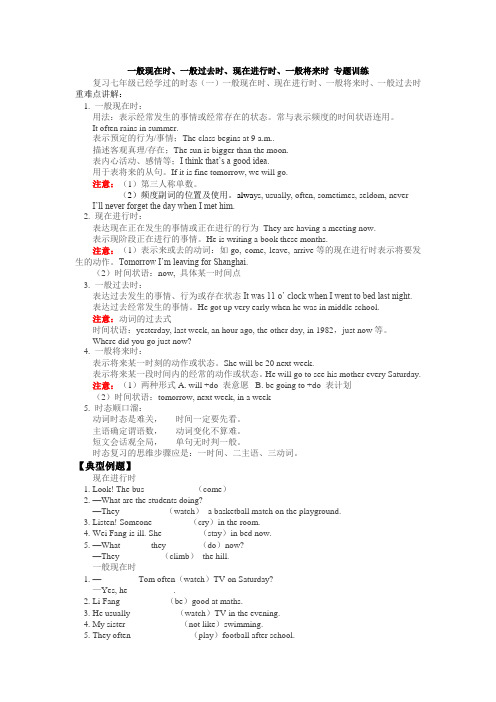
一般现在时、一般过去时、现在进行时、一般将来时专题训练复习七年级已经学过的时态(一)一般现在时、现在进行时、一般将来时、一般过去时重难点讲解:1. 一般现在时:用法:表示经常发生的事情或经常存在的状态。
常与表示频度的时间状语连用。
It often rains in summer.表示预定的行为/事情;The class begins at 9 a.m..描述客观真理/存在;The sun is bigger than the moon.表内心活动、感情等;I think that’s a good idea.用于表将来的从句。
If it is fine tomorrow, we will go.注意:(1)第三人称单数。
(2)频度副词的位置及使用。
alwa ys, usually, often, sometimes, seldom, never I’ll never forget the day when I met him.2. 现在进行时:表达现在正在发生的事情或正在进行的行为They are having a meeting now.表示现阶段正在进行的事情。
He is writing a book these months.注意:(1)表示来或去的动词:如go, come, leave, arrive等的现在进行时表示将要发生的动作。
Tomorrow I’m leaving for Shanghai.(2)时间状语:now, 具体某一时间点3. 一般过去时:表达过去发生的事情、行为或存在状态It was 11 o’ clock when I went to bed last night.表达过去经常发生的事情。
He got up very early when he was in middle school.注意:动词的过去式时间状语:yesterday, last week, an hour ago, the other day, in 1982,just now等。
初中英语时态讲解及练习(全)

时间状语:Tomorrow, next day(week, month, year…),soon, in a few minutes, by…,the day after tomorrow, etc.
否定形式:主语+am/is/are not going to do ; 主语+will/shall not do+其他 一般疑问句:be放于句首;will/shall提到句首。
1.I ____(write, am writing, is writing, are writing) a letter now. 2.Look, it _____(begin, is beginning, am beginning, are beginning) to rain. 3.They ____(study, is studying, am studying, are studying) medicine at the Medical Institute of Chengde these days. 4.He _____(teach, am teaching, is teaching, are teaching) an English lesson at this time.
谓语动词使用过去式形式, 加ed,分为规则和不规则变 化。表示过去经常发生的动 作,也可用“used to do ” 和“would +动词原形”。
1. He____(be, was, were, been) here a moment ago. 2. They ____(be, was, were, been) here just now. 3. The scientists _____(leave, leaves, leaved, left) for America yesterday. 4. Last week we ______(visit, visited ) the Science Museum. 5. When I was a child, I often ____(play, played) football. 6. The students ran out of the classroom as soon as the bell ____(ring, rang, rung).
(完整版)一般现在时,一般过去时,现在进行时,一般将来时练习
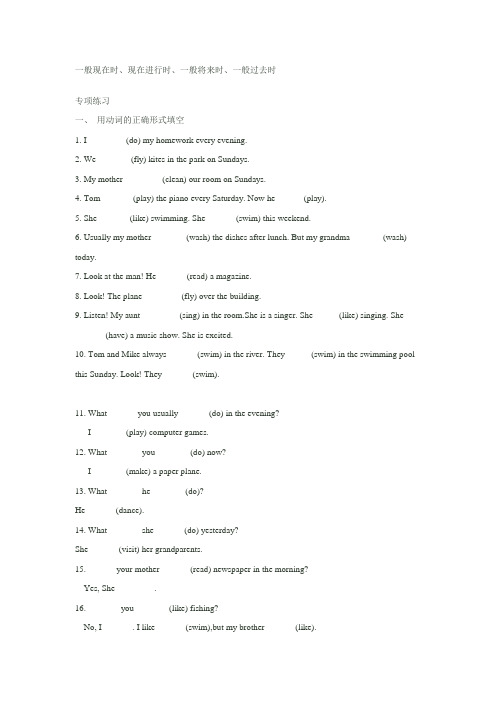
一般现在时、现在进行时、一般将来时、一般过去时专项练习一、用动词的正确形式填空1. I ________ (do) my homework every evening.2. We _______ (fly) kites in the park on Sundays.3. My mother ________ (clean) our room on Sundays.4. Tom _______(play) the piano every Saturday. Now he______ (play).5. She _______(like) swimming. She ______ (swim) this weekend.6. Usually my mother _______ (wash) the dishes after lunch. But my grandma_______ (wash) today.7. Look at the man! He ______ (read) a magazine.8. Look! The plane ________ (fly) over the building.9. Listen! My aunt ________ (sing) in the room.She is a singer. She _____ (like) singing. She_______(have) a music show. She is excited.10. Tom and Mike always ______ (swim) in the river. They _____ (swim) in the swimming pool this Sunday. Look! They ______ (swim).11. What ______ you usually ______ (do) in the evening?I _______ (play) computer games.12. What _______ you _______ (do) now?I _______ (make) a paper plane.13. What _______ he _______ (do)?He ______ (dance).14. What _______ she ______ (do) yesterday?She ______ (visit) her grandparents.15. ______ your mother ______ (read) newspaper in the morning?Yes, She ________ .16. _______ you _______ (like) fishing?No, I ______ . I like ______ (swim),but my brother ______ (like).17. How ______ your father _______ (go) to work every day?He ______ (go) by bike. But it’s cold today. He ______ (take) the No.21 bus,, and he _______ (go) to work by taxi yesterday.18. _______ the monkey _______ (like) climbing trees? Yes, it _______ .19. What _______ your father ______ (do) after lunch? He _______ (read) a comic book. What _____ he _______(do) today? He _______ (clean) the kitchen for my grandma. Look!He (clean).20. ________ you ______ (collect) stamps? Yes. I _______ .________ your brother ______ (collect), too? No, he ________ .二、选择题1. _____ he _____ to the park at 6:30 in the morning? No,he _____ .A. Does; goes; doesB. Does; go; doesn’tC. Does; go; does2. What colour _____ you _____ this bookcase? I _____ it pink.A. are; going to paint; am going to paintB. do; paint; paintC. did; paint; painted3. Tim always _____ a picture at home. He _____ a car now.A. draws; is drawingB. draw; drawC. draws; draw4. She usually _____ her friends. They often _____ tea.A. see; drinkB. sees; drinksC. sees; drink5. He usually _____ the dishes at night, but tonight he _____ clothes.A. wash; washB.washes; is going to washC. is washing; washes6. Mr. Green usually _____ his newspaper in the evening, but he and his wife _____ television yesterday evening.A.reads; watchesB.reads; is going to watchC.reads; watched7. Where are the man and the woman? They _____ near the tree.A. sitB. satC. are sitting8. _____ your penpal _____ diving? No, he _____ .He ______ writing stories.A. Does; like; doesn’t; likesB. Does; likes; doesn’t; likeC. Do; like; don’t; likes9. _____ you _____ fishing yesterday? No, we _____ .A. Does; go; doesn’tB. Did; go; didn’tC. Do; go; don’t10. Open the window, Please. Look! He _____ it.A. opensB. is openningC. is opening11. I usually _____ some milk every day. But I _____ coffee yesterday.A. drink; drankB. is drinking; drinkC. drank; am drinking12. Mr. Green often _____ his newspapers at night. But he _____ an interesting book tonight.A. reads; readsB. reads; readC. reads; is going to read13. The old man _____ playing sports in the park. He _____ morning exercise now.A. likes; is doingB. likes; doesC. like; doing14. What _____ you usually _____ in the evening? I ______ computer games.What _____ you _____ last night? I _____ a book.A. do; do; playB. did; do; playedC. does; do; playsdid; do; read do; do; read do; do; am reading15. Where ______ the boy _____ ? He _____ across the river now.A. does; swim; swimsB. is; swimming; is swimmingD. is; swimming; is swimming16. _____ you _____ to music now? Yes, we _____ .A. Do; listen; doB. Did; listen; didC. Are; listening; are17. Put on you coat, please. OK. I ______ it on.A. am puttingB. am going to putC. put18. _____ you ______ coffee? Yes, I ______ .A. Do; like; doB. Did; like; didC. Are; like; am19. Look! Two cats ______ across the wall.A. runB. runsC. are running20. She _____ tea, but he _____ .A. likes; doesn’t B; like; don’t C. like; doesn’t。
一般现在时、现在进行时、一般将来时、一般过去时专项练习
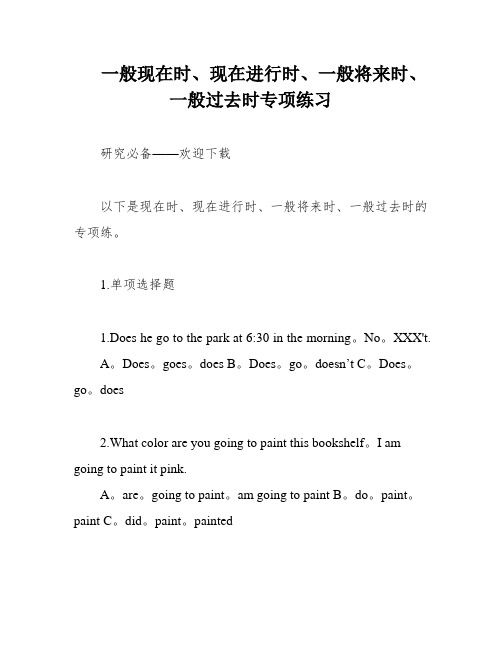
一般现在时、现在进行时、一般将来时、一般过去时专项练习研究必备——欢迎下载以下是现在时、现在进行时、一般将来时、一般过去时的专项练。
1.单项选择题1.Does he go to the park at 6:30 in the morning。
No。
XXX't.A。
Does。
goes。
does B。
Does。
go。
doesn’t C。
Does。
go。
does2.What color are you going to paint this bookshelf。
I am going to paint it pink.A。
are。
going to paint。
am going to paint B。
do。
paint。
paint C。
did。
paint。
painted3.Tim always draws a picture at home。
He is drawing a car now.A。
draws。
is drawing B。
draw。
draw C。
draws。
draw4.XXX.A。
see。
drink B。
sees。
drinks C。
sees。
drink5.XXX。
XXX.A。
wash。
XXX。
XXX washing。
washes6.Mr。
Green usually reads his XXX。
XXX with his wife.A。
reads。
watches B。
reads。
will watch C。
reads。
watched7.Where are the man and the woman。
They are sitting near the tree.A。
XXX sitting8.Is your pen pal into diving。
No。
he isn't。
He is into writing stories.A。
Is。
into。
isn't。
is9.Did you go fishing yesterday。
一般将来时、一般现在时、一般过去时、正在进行时练习题
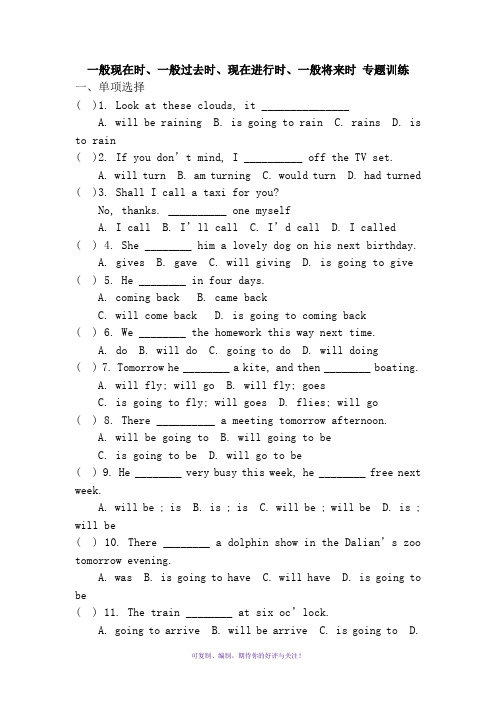
一般现在时、一般过去时、现在进行时、一般将来时专题训练一、单项选择( )1. Look at these clouds, it _______________A. will be rainingB. is going to rainC. rainsD. is to rain( )2. If you don’t mind, I __________ off the TV set.A. will turnB. am turningC. would turnD. had turned ( )3. Shall I call a taxi for you?No, thanks. __________ one myselfA. I callB. I’ll callC. I’d callD. I called ( ) 4. She ________ him a lovely dog on his next birthday.A. givesB. gaveC. will givingD. is going to give ( ) 5. He ________ in four days.A. coming backB. came backC. will come backD. is going to coming back( ) 6. We ________ the homework this way next time.A. doB. will doC. going to doD. will doing( ) 7. Tomorrow he ________ a kite, and then ________ boating.A. will fly; will goB. will fly; goesC. is going to fly; will goesD. flies; will go( ) 8. There __________ a meeting tomorrow afternoon.A. will be going toB. will going to beC. is going to beD. will go to be( ) 9. He ________ very busy this week, he ________ free next week.A. will be ; isB. is ; isC. will be ; will beD. is ; will be( ) 10. There ________ a dolphin show in the Dalian’s zoo tomorrow evening.A. wasB. is going to haveC. will haveD. is going to be( ) 11. The train ________ at six oc’lock.A. going to arriveB. will be arriveC. is going toD.is arriving二、将括号里的词的相应形式进行填空1. We often___________(play) on the playgound.2. He _________(get) up at six o’clock.3. __________you _________(brush) your teeth every morning.4. What (do) he usually (do) after school?5. Danny (study) English, Chinese, Maths, Science and Art at school.6. Mike sometimes __________(go) to the park with his sister.7. At eight at night, she ________(watch) TV with his parents.8. ________ Mike________(read) English every day?9. How many lessons ______your classmate____(have) on Monday?10. What time ____his mother_________(do) the housework?11. Don’t make a noise. Grandpa __________(sleep).12. It ________(take) me two hours to finish my homework last night.13. -What ______ your mother _______(do) every evening?-She _______(wash) clothes.14. _______ it ______ (rain)every day?15. There ________ (be) a football match on TV every morning.16. they often ________ (visit) the Great Wall.17. The earth __________ (move) round the sun.三、写出下列动词的第三人称单数形式:1. wash_________ match _______guess______ study______ finish_________ go________ snow______ carry_________2. stop______ see________ drive ________let_______ carry______ keep_____ join______ find_______ think________ teach______ catch______3.stay_______ begin______ forget_______ lie________die _______run_______prefer______give________ring_______dance______ hope_______四、写出下列动词的过去式tell break build catchbegin draweat come buy cut read putthink go get give keep know改句子1.Do you often play football after school? (肯定回答)2.I have many books. (改为否定句)3.Gao Shan’s sister likes playing table tennis (改为否定句)4. She lives in a small town near New York. (改为一般疑问句)5.I watch TV every day. (改为一般疑问句)6. David has a goal. (改为一般疑问句)7. We have four lessons.(否定句)8. Nancy doesn’t run fast (肯定句)9. My dog runs fast. (一般疑问句)10. Su Yang usually washes some clothes on Saturday.(划线提问)11. Su Yang usually washes some clothes on Saturday. (划线提问)12. Mingming usually waters the flowers every day。
(初中时态语态练习)一般现在时-一般过去时-一般将来时-现在进行时-混合练习2(附答案)

一、根据要求改写下列句子。
1. Thisismypencil.(变为一般疑问句)2. SheisgoingonatriptoBeijingnow.(用I 做主语改写句子)3. Hefoundsomemeatinthefridge.(改为一般疑问句)4. Itisgoingtobeafinedaytomorrow.(改为否定句)5. IstayathomeonSaturdays.(对划线部分提问)6. Thatbirdisred.(对划线部分提问)7.8. 9. 10. 11. 12. 13. 14. 15. 16. 17. 18. is,what,thegirl,overthere,inred,doing(?)(连词成句)19. AmytooksomephotosatthezoolastSaturday.(改为否定句)20. WehaveamusicclassonThursday.(用rightnow 改写句子)21. Mr.BrownwillvisittheGreatWallnextsummer.(对划线部分提问)22. Doyouoftentakeexercise?(用now 改写句子) 23. Lucydidherhomeworkathome.(改为否定句) 24. Heiswritingasongonthecomputernow.(用lastnight 改写句子)对))为同义用对划线对划线3.---I________theminhalfanhour.A.washedB.havewashedC.willwas hD.wash4.Some________intheriverandsome________onthebeachnow.A.areswimming;arechattingB.isswimming;ischattingC.swim;chatD.swims;chats 5.Nowwatchcarefullyandseewhat________.A.happenedB.happeningC.ishappenedD.ishappening6.---Couldyoutellme________tomorrowmorning?---Well,itwillstartat9o ’clock. A.whenthefilmwillstart B.wherewillthefilmstart C.whenwillthefilmstartD.wherethefilmwillstart7.---WouldyoupleaseturndowntheTValittle?Jackisdoinghishomework.---Terriblesorry.I________. A.will B,amgoingtoC.won'tD.do8.---DoyouknowwhetherDavidwillgocyclingornottomorrow?---David?Never!He________outdooractivities.A.hatesB.hatedC.ishatingD.hashated9.Don'tmakesomuchnoise.Thestudents________anEnglishclass.A.arehavingB.haveC.hadD.werehaving10.I’msorryIleltthebookathome.I________itheretomorrow,Ipromise.A.bringB.willbringC.broughtD.havebrought11.---________thestudents________English?---Yes,theyare.A.Are;readingB.Do;readingC.Is;readingD.Are;read12.I________therelastmonth.A.goB.wentC.havegoneD.willgo13.---Hi,Jim!Nicetomeetyou!---Hi,itisoneyearsinceI________youlasttime.A.sawB.seeC.seeingD.haveseenA.isA.Idon'tA.amB.will20.I’A.makeA.write25.NowI________whoheis.A.amknowingB.knowC.knewD.wasknown26.MikeisfromAmerica.He________English.A.spokeB.willspeakC.speaksD.hadspoken27.---WhatdoyouthinkofthefilmAvatar?---It'sfantastic.butI________thebeginningofit.A.sawB.didn’tseeC.can’tseeD.willsee28.---CanIhelpyou?---Ibroughtthiswatchhereyesterday,butit________work.A.won'tB.didn'tC.doesn’tD.wouldn't29.---Isthisraincoatyours?---No,mine________therebehindthedoor.A.ishangingB.hangsC.hungD.willhung30.It'sreportedthatshe______CultureSquareinTaiannextyear.A.willbuildB.werebuiltC.havebuiltD.willbuild31.Itwillbehardforustogetupinthemorningifwe________tobedtoolate.A.goB.wentC.willgoD.hasgone32.Mysisterwantsanewdress.She________ittotheparty.A.wearsB.haswornC.woreD.isgoingtowear33.Tinaandherparents________toEnglandforsightseeinglastsummer.A.goB.wentC.willgoD.havegone34.Thisterm________over.Thesummervacationiscomingintwoweeks.A.isB.wasC.hasbeenD.willbe35.---What'shisbrother?---Heisateacher.He________mathataschool.A.taughtB.hastaughtC.teachesD.willteachA.cleanA.go47.Thegirlhasagreatinterestinsportsandshe________badmintonclassestwiceaweekA.tookB.istakingC.takesD.hasbeentaking48.---When________Jessy________toNewYork?---Yesterday.A.does;getB.did;getC.has;gotD.had;got49.---________?---He’slisteningtomusic.A.WhatdoeshedoB.WhatishedoingC.HowishedoingD.Whoishe50.Myfriend________me.Ihavetoleavenow.A.waitsforB.waitedforC.iswaitingforD.waswaitingfor51.ThereportersaidthattheUFO________easttowestwhenhesawit.A.travelsB.traveledC.wastravelingD.hastraveled52.---Sam,whatwilltheweatherbeliketomorrow?---Sorry,Mum.Ididn'twatchtheweatherforecast(天气预报)justnow.I________afootballmatch.A.waswatchingB.amwatchingC.wouldwatchD.willwatch53.I________tomeetyou,butI________you.A.went;hadn’tseenB.didgo;didn'tseeC.hadgone;didn'tseeD.wasgoing;hadn’tseen54.He_______anothernewsubwaystationinthatcityin2035.A.wasbuiltB.buildC.willbuildD.willbebuilt55.Travellingtospaceisnolonger(不再)justadream.Russia________thefirsthotelinspaceinthenearfuture.A.buildsB.willbuildC.builtD.hasbuilt56.---Hello!I’mverygladtoseeyou.---When________you________here?A.did;arriveB.will;arriveC.have;arrivedD.arearrivinge64.---Let’A.doB.didA.rainsA.ishaving70.---________youtakeabustoschool?---Yes,butnowIusuallygotoschoolonfoot.A.Did;B.Were;C.DoD.Does71.---Howwasyourtriptotheancient(古代的)village?---Fantastic!We________toamuseumofstrangestones.A.goB.wentC.aregoingD.willgo72.---Hello,Mary!ThisisJohn.YoumustknowwhyI________you.---Oh,hello,John!I’vewaitedforthiscallsincelastmonth.A.calledB.amcallingC.wascallingD.havecalled73.---Whatareyoudoing,Simon?---Ifinishmyhomework,andnowI________thecomputergames.A.playedB.wasplayingC.amplayingD.play74.Thezookeeperisworriedbecausethenumberofvisitors________smallerandsmaller.A.becomeB.becameC.isbecomingD.havebecome75.Idon'tknowifhe________totheEnglishcorner,butIwillaskhimaboutthatwhenhe________totheclass.A.goes;willcomeB.willgo;willcomeC.goes;comesD.willgo;comes76.---Ican'tfindDavid.Whereishe?---He________fortomorrow’scompetitionathome.A.preparesB.ispreparingC.haspreparedD.prepared77.---Canyouopenthedoor,Jim?I________thedishes.---I’mcoming,Dad.A.doB.didC.havedoneD.amdoin g78.________you________tomorrow?A.Do;leaveB.Have;leftC.Are;leavingD.Did;leave79.Thepopulationoftheworld________still________now.A.has;grownB.is;growingC.will;growD.is;grown80.Look!Peter________TVhappily,buthisparentsarebusyinthekitchen.A.iswatchingB.watchesC.watched81.I’A.likesA.willgoA.WillA.itwon'tA.istakingB.takesC.tookD.wastaking92.---Canyougoshoppingwithme?---Sorry,I________aletter,soIcan’tgowithyou.A.arewritingB.amwritingC.iswritingD.waswriting93.Ifourgovernment________attentiontocontrollingfoodsafetynow,ourhealth________indanger.A.won’tpay;isB.doesn'tpay;isC.won'tpay;willbeD.doesn'tpay;willbe94.Mr.Smith________shortstories,buthe________aTVplaythesedays.A.iswriting;iswritingB.iswriting;writesC.writes;iswritingD.writes;writes95.---DoesshelikesingingEnglishsongs?---Yes.She________tosingEnglishsongsinherroom.A.oftendoesB.isoftenheardC.oftenhears96.---HaveyouheardofEarthDay?---Yes.People_______thefirstEarthDayin1970toeducateustoprotectourplanet.A.celebratesB.celebratedC.iscelebratedD.wascelebrated97.---What________yourbrother________underthetable?---Heislookingforhispen.A.does;doB.did;doC.is;doingD.do;did98.Ifyou________carefully,you________thereportwell.A.willlisten;willbeunderstoodB.willlisten;understandC.listen;willunderstandB.willlisten;willunderstand99.Tommyislookingforthewatch,hisuncle________tohimlastmonth.(finish,write)A.givesB.gaveC.togiveD.hasgiven100.Whatareyougoingtodothisafternoon?---Wearegoingtohaveafootballmatchifit________(not.rain).101.---Oh,myGod!Ican'tfindmykeytotheoffice.---Don'tworry.Perhapsyou________itatyourhome.A.leftA.arrivedA.haveA.getsA.haveA.amB.doA.visitA.willtakeB.tookC.amtakingD.take113.Sarah________singing,butshelikesdancing.Look!She________there.A.doesn'tlike;isdancingB.doesn'tlike;danceC.isn’tlike;isdancingD.don'tlike;isdancing114.---He_______Ourclassroomeveryday.---Soitis.It’sourdutytokeepitcleanandtidy.A.cleansB.iscleaningC.cleanedD.clean115.---Ssh,bequite!Thebaby________inthenextroom.---Oh,sorry.A.sleepsB.sleptC.issleepingD.wassleeping116.---Hello,Jim.---Hello,Tom.I________youwouldcomealittlelater.A.thinksB.thoughtC.amthoughtD.willthink117.TodayisFather’sDay.Mymother________aspecialdinnerformygrandpanow.A.prepareB.preparedC.ispreparingD.willprepare118.Idon'tknowifJack________.Ifhe________,callme,please.A.willcome;willcomees;comees;willcomeD.willcome;comesstSundaymyaunt________athomewithme.WewerewatchingTVallday.A.wasB.wereC.isD.are120.---Sam,comedownstairs,please.Ineedyourhelp.---Sorry,Mum.I________onthephone.A.amtalkingB.talkedC.wastalkingD.havetalked121.---Let’sgoouttoflykites,shallwe?---OK.I________.A.willcomeB.amgoingtocomeeD.amcoming122.Itwillbehardforustogetupinthemorningifwe________tobedtoolate.A.goB.wentC.willgoD.havegone123.---Whereisyourcousin?---He________anEnglishexamnow.A.hasB.hadC.hashadD.ishavingA.was。
初中一般现在时,一般过去时,一般将来时,现在进行时总结练习

精心整理现在进行时态1.定义:现在进行时表示正在发生或进行的动作。
2.标志词:(1)时间状语now、atthemoment(2)句前有提示词look、listen、lookat…3.谓语动词的构成:be+动词-ing1.我们正在看电视。
WeTV.2.Tom在图书馆看书。
Tombooksinthelibrary.3.康康在操场上打篮球。
Kangkangisplayingbasketball.4.他此刻正在睡觉。
Heissleeping.5.玛利亚在做什么?WhatMarianow?6.你在做作业吗?youyourhomework?四.句型转换。
1.Iamrunningontheplayground.(变否定句)Iontheplayground.2.Sheisdancinginthegym.(变一般疑问句,并做肯定回答) dancinginthegym?Yes,.3.Theyaresleepingatthemoment.(划线部分提问)theyatthemoment?五.将下列句子改成现在进行时1.??IwatchTVeveryday.I_________________TVnow.2.?Sheworksinahospital.She_________________inhospital.3.?Doyoureadthisbook?____?you??________thisbook.4.TomandSamhavelunchatabouttwelve.14.BillyandBob_______________(play)football.15.They____________(have)funtogether.七、选择填空。
(?)1.Whatareyoudoing?I’m_____aninterestingbook.A.looking???????????????B.seeing???????????????????C.reading???????? ?????????(?)2.What___yoursisterdoing?She_____cleaningthefloor.A.are,is?????????????Bdoes,is?????????????C.is,is????(?)3.Kateis?___hergreendressnow.A.puttingon???????????Bputson??????????????????????Cwear????????? ?(?)4.Isshe___herhomework?No,she___.A.do,doesn’t?????Bdoes,isn’t????Cdoing,is?????Ddoing,isn’t(?)5.Look!Thecousins_____newsweaters.??A.arewearing??????B.wearing????????C.arewear??D.iswearing一般现在时go__________catch_________brush(刷)_____wash___________do________like________have___________watch________drink___________fly___________say_______learn___________eat___________read___________sing___________buy__________ study_______stay__________make__________look____buy__________pass__________carry____come__________plant(种植)______teach_______2.用括号内动词的适当形式填空。
(完整版)一般现在时一般过去时现在进行时过去进行时归纳总结

stop →stopped
停
止
drop →dropped
掉
下
prefer →preferred 宁愿
3. 现在进行时 ( 1)现在进行时的构成 现在进行时由“主语 +am / is / are + 动词的现在分词”构成。 否定形式:主语 +am / is / are +not + 动词的现在分词。 疑问形式“ Am / Is /Are + 主语 + 动词的现在分词。 肯定回答: Yes ,主语 +am / is / are . 否定回答: Not , 主语 +am / is /are + not .
3) once a year, twice a month , three times a week 之类的表示频率的词组。
2.一般过去时
1
( 1)一般过去时的构成:一般过去时用动词的过去式表示。
Last week Tom made a model plane with his friend Jack. 上周汤姆和他的朋友杰克做了一个飞机模型。 ( 2)一般过去时的用法
There goes the bell . 铃响了。 ( 3)与一般现在时连用的有时间状语
1)表示频度的副词 always , often , usually , sometimes 等。
2) on Sandy, on Monday afternoon, every day , in the morning, every year 等时间状词。
(1) 一般情况下,在动词后加 -ed 构成:
work→worked
工
作
笑seem→seemed似 Nhomakorabea看
(完整版)初一英语各种时态复习及练习题
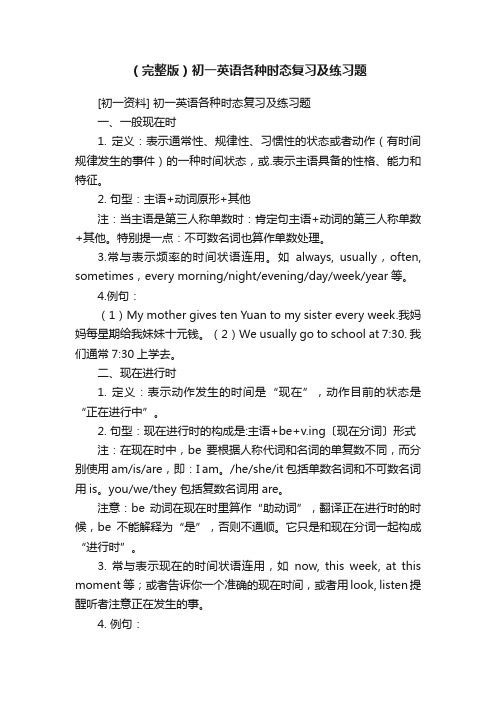
(完整版)初一英语各种时态复习及练习题[初一资料] 初一英语各种时态复习及练习题一、一般现在时1. 定义:表示通常性、规律性、习惯性的状态或者动作(有时间规律发生的事件)的一种时间状态,或.表示主语具备的性格、能力和特征。
2. 句型:主语+动词原形+其他注:当主语是第三人称单数时:肯定句主语+动词的第三人称单数+其他。
特别提一点:不可数名词也算作单数处理。
3.常与表示频率的时间状语连用。
如always, usually,often, sometimes,every morning/night/evening/day/week/year等。
4.例句:(1)My mother gives ten Yuan to my sister every week.我妈妈每星期给我妹妹十元钱。
(2)We usually go to school at 7:30. 我们通常7:30上学去。
二、现在进行时1. 定义:表示动作发生的时间是“现在”,动作目前的状态是“正在进行中”。
2. 句型:现在进行时的构成是:主语+be+v.ing〔现在分词〕形式注:在现在时中,be 要根据人称代词和名词的单复数不同,而分别使用am/is/are,即:I am。
/he/she/it 包括单数名词和不可数名词用is。
you/we/they 包括复数名词用are。
注意:be 动词在现在时里算作“助动词”,翻译正在进行时的时候,be不能解释为“是”,否则不通顺。
它只是和现在分词一起构成“进行时”。
3. 常与表示现在的时间状语连用,如now, this week, at this moment 等;或者告诉你一个准确的现在时间,或者用look, listen提醒听者注意正在发生的事。
4. 例句:(1)They are playing basketball now.现在他们正在打篮球。
(2)Listen! She is singing a song.听,她正在唱歌。
一般现在时--一般过去时---现在进行时--过去进行时归纳总结
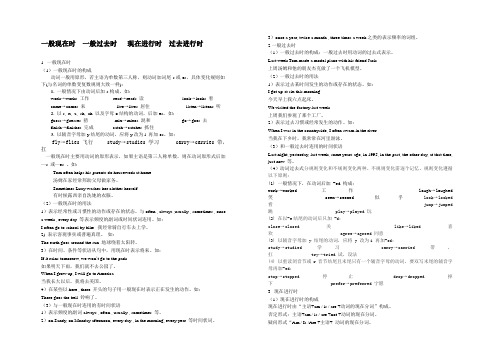
一般现在时一般过去时现在进行时过去进行时1. 一般现在时(1)一般现在时的构成动词一般用原形,若主语为单数第三人称,则动词加词尾-s或-es,具体变化规则如下(与名词的单数变复数规则大致一样):1.一般情况下由动词后加-s构成。
如:work→works 工作read→reads 读look→looks 看come→comes 来live→lives 居住listen→listens 听2.以s, x, z, sh, ch 以及字母o结构的动词,后加-es。
如:guess→guesses 猜mix→mixes 混和go→goes 去finish→finishes 完成catch→catches 抓住3.以辅音字母加y结尾的动词,应将y改为i 再加-es。
如:fly→flies 飞行study→studies 学习carry→carries 带,扛一般现在时主要用动词的原形表示,如果主语是第三人称单数,则在动词原形式后加—s 或—es 。
如:Tom often helps his parents do housework at home.汤姆在家经常邦助父母做家务。
Sometimes Lucy washes her clothes herself.有时候露西亲自洗她的衣服。
(2)一般现在时的用法1)表示经常性或习惯性的动作或存在的状态。
与often , always ,usually , sometimes , once a week , every day 等表示频度的副词或时间状词连用。
如:I often go to school by bike. 我经常骑自行车去上学。
2) 表示客观事实或普遍真理。
如:The earth goes around the sun .地球绕着太阳转。
3)在时间、条件等状语从句中,用现在时表示将来。
如:If it rains tomorrow, we won’t go to the park.如果明天下雨,我们就不去公园了。
一般现在时、现在进行时、一般将来时、一般过去时知识点总结
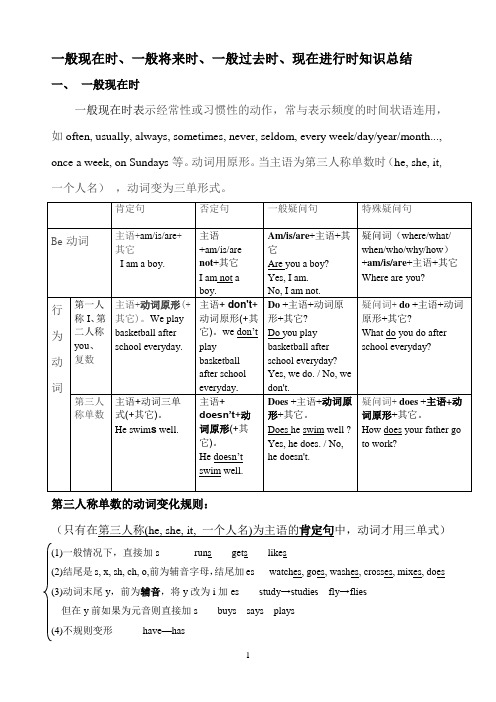
一般现在时、一般将来时、一般过去时、现在进行时知识总结一、一般现在时一般现在时表示经常性或习惯性的动作,常与表示频度的时间状语连用,如often, usually, always, sometimes, never, seldom, every week/day/year/month..., once a week, on Sundays等。
动词用原形。
当主语为第三人称单数时(he, she, it, 一个人名),动词变为三单形式。
第三人称单数的动词变化规则:(只有在第三人称(he, she, it, 一个人名)为主语的肯定句中,动词才用三单式)(1)一般情况下,直接加s runs gets likes(2)结尾是s, x, sh, ch, o,前为辅音字母,结尾加es watches, goes, washes, crosses, mixes, does(3)动词末尾y,前为辅音,将y改为i加es study→studies fly→flies但在y前如果为元音则直接加s buys says plays(4)不规则变形have—has二、一般将来时一般将来时表示将来发生的事。
常与tomorrow, next day/week/month/year..., soon, in a few minutes, the day after tomorrow, in the future等时间状语连用。
Will/shall +动词原形;(shall用语第一人称)be(am/is/are) going to+ 动词原形三、一般过去时一般过去时表示过去某一时候或某一段时间所发生了的事情或存在的状态。
常与过去时间yesterday,ago, this morning,just now,a moment ago,last night / year / week/month,once upon a time,the other day,before,the day before yesterday, in 1989, at the age of five, one day, then(那时), on that day,in the past连用。
一般过去时,一般将来时,一般现在时,过去进行时,现在进行时,现在完成时综合练习
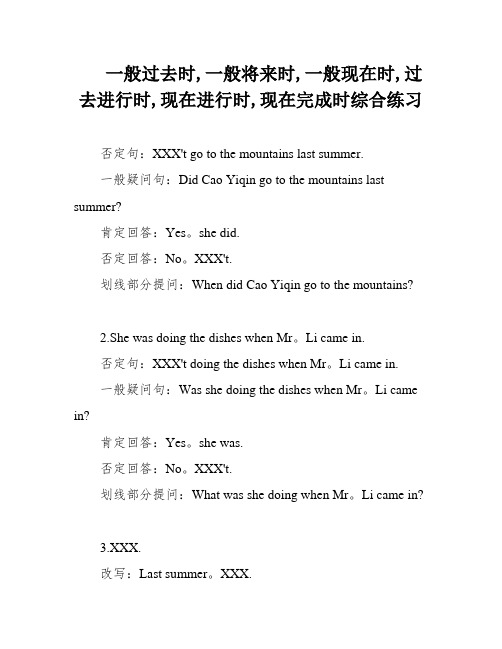
一般过去时,一般将来时,一般现在时,过去进行时,现在进行时,现在完成时综合练习否定句:XXX't go to the mountains last summer.一般疑问句:Did Cao Yiqin go to the mountains last summer?肯定回答:Yes。
she did.否定回答:No。
XXX't.划线部分提问:When did Cao Yiqin go to the mountains?2.She was doing the dishes when Mr。
Li came in.否定句:XXX't doing the dishes when Mr。
Li came in.一般疑问句:Was she doing the dishes when Mr。
Li came in?肯定回答:Yes。
she was.否定回答:No。
XXX't.划线部分提问:What was she doing when Mr。
Li came in?3.XXX.改写:Last summer。
XXX.1.My family and I went on a trip to Europe last summer。
We visited many countries。
such as France。
Italy。
XXX.否定句:My family and I did not go on a trip to Europe last summer.一般疑问句:Did your family and you go on a trip to Europe last summer?肯定回答:Yes。
we did.否定回答:No。
we did not.划线部分提问:What did you see during your trip to Europe?2.XXX。
I woke up early and went for a jog。
中考英语时态基础知识点(现在完成时、将来时、过去时、现在进行时、一般现在时)以及习题整理
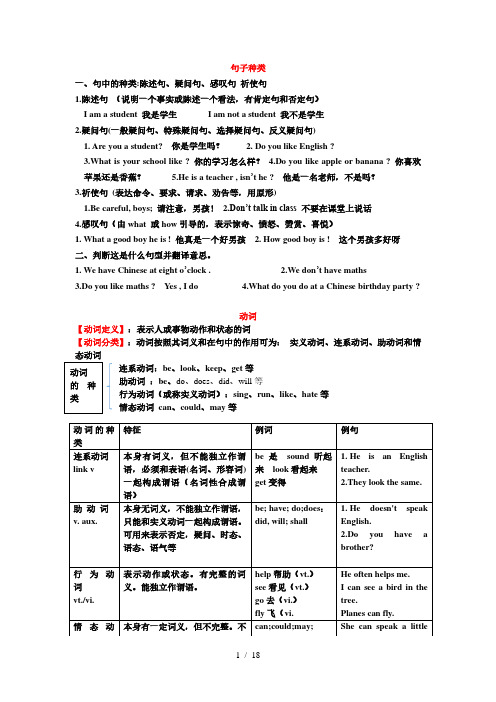
句子种类一、句中的种类:陈述句、疑问句、感叹句 祈使句1.陈述句 (说明一个事实或陈述一个看法,有肯定句和否定句) I am a student 我是学生 I am not a student 我不是学生2.疑问句(一般疑问句、特殊疑问句、选择疑问句、反义疑问句) 1. Are you a student? 你是学生吗? 2. Do you like English ?3.What is your school like ? 你的学习怎么样?4.Do you like apple or banana ? 你喜欢苹果还是香蕉?5.He is a teacher , isn ’t he ? 他是一名老师,不是吗? 3.祈使句 (表达命令、要求、请求、劝告等,用原形)1.Be careful, boys; 请注意,男孩!2.Don’t talk in class 不要在课堂上说话 4.感叹句(由what 或how 引导的,表示惊奇、愤怒、赞赏、喜悦)1. What a good boy he is ! 他真是一个好男孩2. How good boy is ! 这个男孩多好呀 二、判断这是什么句型并翻译意思。
1. We have Chinese at eight o ’clock .2.We don ’t have maths3.Do you like maths ? Y es , I do4.What do you do at a Chinese birthday party ?动词【动词定义】:表示人或事物动作和状态的词【动词分类】:动词按照其词义和在句中的作用可为: 实义动词、连系动词、助动词和情态动词连系动词:be 、look 、keep 、get 等 助动词 :be 、do 、does 、did 、will 等 行为动词(或称实义动词):sing 、run 、like 、hate 等 情态动词 can 、could 、may 等提问: 1.举出三个系动词,并说出它的特征。
(完整版)一般现在时,一般过去时,现在进行时,一般将来时练习
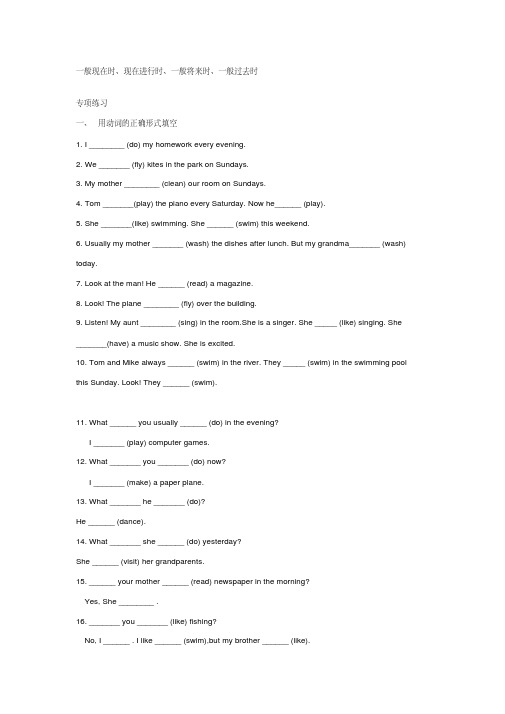
一般现在时、现在进行时、一般将来时、一般过去时专项练习一、用动词的正确形式填空1. I ________ (do) my homework every evening.2. We _______ (fly) kites in the park on Sundays.3. My mother ________ (clean) our room on Sundays.4. Tom _______(play) the piano every Saturday. Now he______ (play).5. She _______(like) swimming. She ______ (swim) this weekend.6. Usually my mother _______ (wash) the dishes after lunch. But my grandma_______ (wash) today.7. Look at the man! He ______ (read) a magazine.8. Look! The plane ________ (fly) over the building.9. Listen! My aunt ________ (sing) in the room.She is a singer. She _____ (like) singing. She _______(have) a music show. She is excited.10. Tom and Mike always ______ (swim) in the river. They _____ (swim) in the swimming pool this Sunday. Look! They ______ (swim).11. What ______ you usually ______ (do) in the evening?I _______ (play) computer games.12. What _______ you _______ (do) now?I _______ (make) a paper plane.13. What _______ he _______ (do)?He ______ (dance).14. What _______ she ______ (do) yesterday?She ______ (visit) her grandparents.15. ______ your mother ______ (read) newspaper in the morning?Yes, She ________ .16. _______ you _______ (like) fishing?No, I ______ . I like ______ (swim),but my brother ______ (like).。
初中一般现在时,一般过去时,一般将来时,现在进行时总结练习
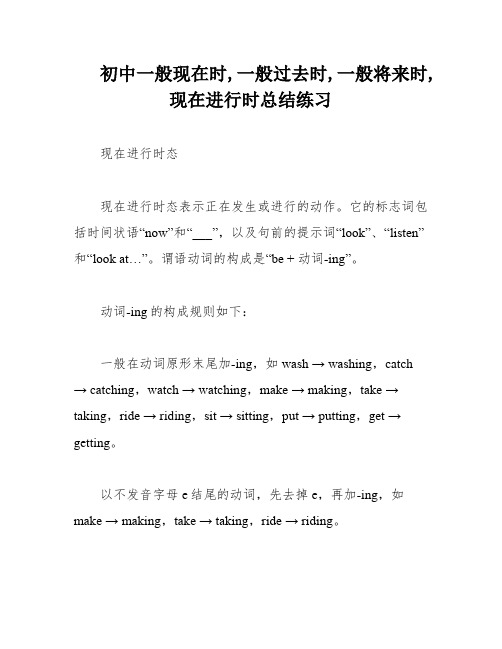
初中一般现在时,一般过去时,一般将来时,现在进行时总结练习现在进行时态现在进行时态表示正在发生或进行的动作。
它的标志词包括时间状语“now”和“___”,以及句前的提示词“look”、“listen”和“look at…”。
谓语动词的构成是“be + 动词-ing”。
动词-ing的构成规则如下:一般在动词原形末尾加-ing,如wash → washing,catch→ catching,watch → watching,make → making,take → taking,ride → riding,sit → sitting,put → putting,get → getting。
以不发音字母e结尾的动词,先去掉e,再加-ing,如make → making,take → taking,ride → riding。
以重读闭音节(辅元辅)结尾的动词,双写末尾辅音,再加-ing,如sit → sitting,put → putting,get → getting。
特殊的动词现在分词形式包括lie → lying。
现在分词的练:helping,coming,swimming,eating,giving,finding,sitting,writing,___,making,playing,cleaning,catching,walking,riding,running,drawing,listening,beginning,dancing,watching,sleeping,seeing,having。
填空练:1.Look。
The boy is reading books.2.The girls are having breakfast now.3.___。
No。
___’t.4.___ ___.5.Listen。
They are singing in the music room. 汉译英练:1.___.2.Tom is reading books in the library.3.___ ___.4.He is ___.5.What is Maria doing now?1.Are you doing your homework?2.I am not running on the playground.3.Is she dancing in the gym。
一般现在时一般过去时一般将来时现在完成时综合练习
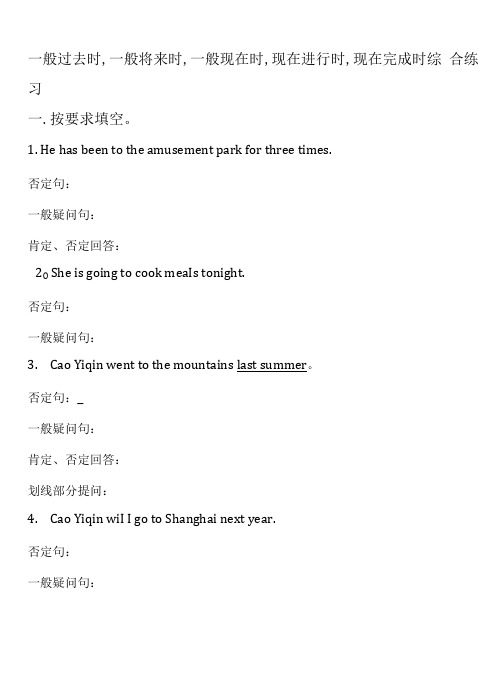
一般过去时,一般将来时,一般现在时,现在进行时,现在完成时综合练习一.按要求填空。
1. He has been to the amusement park for three times.否定句:一般疑问句:肯定、否定回答:2O She is going to cook meaIs tonight.否定句:一般疑问句:3.Cao Yiqin went to the mountains last summer。
否定句:_一般疑问句:肯定、否定回答:划线部分提问:4.Cao Yiqin wiI I go to Shanghai next year.否定句:一般疑问句:肯定、否定回答:(word完整版)一般现在时—一般过去时—一般将来时—现在完成时综合练习5O I often pI ay footbaI I o否定句:一般疑问句:肯定、否定回答:6. Cao Yiqin often goes to bed at 10:30 at night o否定句:一般疑问句:肯定、否定回答:7O写出下列动词的现在分词、过去式和过去分词.buy cut dr i nk eat fa I Ifee I _____________________________________f i ght f i nd get give go hearI earn I ose meetpay readrun ______________ ________________ ________________say send s i t s I eep stand sw i mteach te I Ith i nk 二.选择题。
1. How Iong has Eliza been a nurse?Ao Sinee 2002. B. Four years ago。
C. In 2002.2.----- May I speak to Tom? -------------- S orry, he is not at home. Heto Shangha i. Ao has been B o has gone Co goes3.-How was your weekend on the farm? 一Great! We with the farmers oAo enjoy ourseIves B. went fishing C. wi I I work Do make fr i ends 4.——you ever to the Un i ted States?(word完整版)一般现在时—一般过去时—一般将来时—现在完成时综合练习一Yes, twice.A. Have: goneB. Have: beenC. Do: goD. Were: going5O They have been i n th i s city three years ago oAo for B. about Co s i nee60 - have you been I earn i ng Eng Ii sh?—I have been I earn i ng Eng Ii sh for s i x years oAo How Iong B. How often Co How far7.一Where i s Zhang Mi ng? ------ Oh, he to Bei jng and he wi I Ibe back tomorrow0A. has beenB. has goneC. goes8.The Greens supper now. A: is having B:are; havingC: is haveing9.you usuaI Iy to schooI with cI assmates ?A. Do, comesB. does, comeC. Do, come1Oo Mr Green usually newspapers after supper every day.A. readB. read i ngC. reads11.He I en(wash ) c I othes? Yes , she i s . Ao Is, washing B. Does , wash Co Is,washes12. There a dolphin show in the zoo tomorrow evening.A. wasB. is going to have Q wi I I have D o is go i ng to be 13. He her a beaut i fuI hat on her next b i rthday.A. givesB. gaveC. will giving D o is going to giving 14o There a meeting tomorrow afternoon.A. wi I I be going to B o wi I I going to be Co is going to be D. will go to be 三.填空题.1.我母亲通常在星期日打扫卫生、洗衣服。
- 1、下载文档前请自行甄别文档内容的完整性,平台不提供额外的编辑、内容补充、找答案等附加服务。
- 2、"仅部分预览"的文档,不可在线预览部分如存在完整性等问题,可反馈申请退款(可完整预览的文档不适用该条件!)。
- 3、如文档侵犯您的权益,请联系客服反馈,我们会尽快为您处理(人工客服工作时间:9:00-18:30)。
现在进行时态1.定义:现在进行时表示正在发生或进行的动作。
2.标志词:(1)时间状语now、atthemoment(2)句前有提示词look、listen、lookat…3.谓语动词的构成:be+动词-ing注:lie---lying一.写出下列动词的现在分词形式。
help_______come_______swim_______eat_______give_______find_______sit_______write_______tie_______make_______play_______clean_______catch_______walk_______ride_______run_______draw_______listen_______begin_______dance_______ watch_______sleep_______see_______have_______二.用所给词的适当形式填空。
!Theboy(read)books.(have)breakfastnow.3.—he(clean)theblackboard—No,heisn’t.(play)footballontheplaygroundatthemoment.!They(sing)inthemuiscroom.三.汉译英。
1.我们正在看电视。
WeTV.在图书馆看书。
Tombooksinthelibrary.3.康康在操场上打篮球。
Kangkangisplayingbasketball.4.他此刻正在睡觉。
Heissleeping.5.玛利亚在做什么WhatMarianow6.你在做作业吗youyourhomework四.句型转换。
.(变否定句)Iontheplayground..(变一般疑问句,并做肯定回答) dancinginthegymYes,..(划线部分提问)theyatthemoment五.将下列句子改成现在进行时1..2..3.Doyoureadthisbook____you________thisbook..KittyandBen______________lunchatabouttwelve. 5.Theycleantheroomintheevening.They______________theroomnow.六.完成下列现在进行时的句子:1.Thestudents___________(listen)totheteachernow.2.LiLei______________(watch)TVnow.3.She___________(look)atanicepicturenow.4.Look!Theboys______________(play)basketball.5.Listen!They_____________(sing)asong.6.Acat_____________(run)upthetreenow.7.I____________(get)upnow.8.Hermother______________(wash)thedishesnow.9.He_____________(go)totheparknow.___________(sit)inthepark.(clean)theroomnow.(drink)somemilk._______(sleep)behindthedoor.(play)football.(have)funtogether.七、选择填空。
()I’m_____aninterestingbook.()She_____cleaningthefloor.,isBdoes,is,is()___hergreendressnow.BputsonCwear()No,she___.A.do,doesn’tBdoes,isn’tCdoing,isDdoing,isn’t()!Thecousins_____newsweaters.一般现在时一、概述二、一般现在时表示习惯性、经常性、反复性的动作或存在的状态。
“习惯性、经常性、反复性”是一般现在时的三大特性,它不表示特定时间内发生的事。
三、二、一般现在时的结构1.句中有be动词时,用is,am,are2.句中无be动词时,用动词原形。
若主语为第三人称单数,动词变成单三。
三、动词第三人称单数变化规则1.一般在词尾加-s。
2.以-o,-s,-x,-sh,-ch结尾的加-es。
3.以辅音字母加y结尾的,变y为i,再加-es。
四、标志频度副词,everyday,everyweek,everyyear…1.写出下列动词的三单形式go__________catch_________brush(刷)_____wash___________do________like________have___________watch________drink___________fly___________say_______learn___________eat___________read___________sing___________buy__________study_______stay__________make__________look____buy__________pass__________carry____come__________plant(种植)______teach_______2.用括号内动词的适当形式填空。
(play)intheplayground.(get)upatsixo’clock.(brush)yourteetheverymorning.(do)heusually______(do)afterschool(study)English,Chinese,Maths,ScienceandArtatschool.(go)totheparkwithhissister.,sheoften__________(watch)TVwithhisparents.(read)Englisheveryday(have)onMonday(do)thehousework3.选择题():00 inthemorning.().A.don''''train().Arose;setBrises;setsCrises,setDrise;sets().Alike;listenBlikes;listensClike;arelisteningDliking;listen ().AhasstudyBstudiesCstudyDstudied4.改错(划出错误的地方,将正确的写在横线上)____________________________________'5.把下列句子变成一般疑问句(并作肯定和否定回答)、否定句.....7.Amylikesplayingcomputergames.8.Shecanplaythepianowell.一般将来时1.定义:表示将来发生的事或动作。
2.标志:inthefuture,nextyear,nextday,in+时间段,tomorrow,3.构成:begoingto+动词原形Will+动词原形一、单项选择()1.There__________ameetingtomorrowafternoon.(不,不要。
),youwon’t.,youaren’(不去).’t.’二、动词填空。
(leave)(finish)allmyworkbeforeI______(leave). 2.—Howlong_____you_____(study)inourcountry—I_____(plan)tobehereforaboutonemoreyear.—I_____(hope)tovisittheotherpartsofyourcountry.—What______you______(do)afteryou______(leave)here—I______(return)homeand______(get)ajob.(be)(go)tobedearlytonight.’sbirthdayisnextMonday,hermother_____(give)herapresent.(snow)soon.6.—_____you_____(be)herethisSaturday—(visit)myteacher.7.—______I______(get)youacopyoftoday’snewspaper —Thankyou.(be)’tjoinyou.(believe,not)thisuntilhe______(see)itwithhisowneyes.’tthinktheirteam______(win).三、用所给动词的一般将来时填空(leave)(finish)allmyworkbeforeI______(leave). 2.—Howlong_____you_____(study)inourcountry?—I_____(plan)tobehereforaboutonemoreyear.—I_____(hope)tovisittheotherpartsofyourcountry.—What______you______(do)afteryou______(leave)here?—I______(return)homeand______(get)ajob.(be)(go)tobedearlytonight.’sbirthdayisnextMonday,hermother_____(give)herapresent. (snow)soon.6.—_____you_____(be)herethisSaturday?—(visit)myteacher.7.—______I______(get)youacopyoftoday’snewspaper?—Thankyou.(be)’tjoinyou.(believe,not)thisuntilhe______(see)itwithhisowneyes.’tthinktheirteam______(win).一般过去时1.定义:一般过去时表示过去某个时间发生的动作或存在的状态。
2.构成:(1)句中若有be动词,用was或were;(2)句中若无be动词,用实意动词过去式的形式。
3.标志:in+年份,yesterday,last(day,week,month,year),justnow,thedaybeforeyesterday.4.行为动词的一般过去式变化规则①一般在动词原形末尾直接加上-ed。
